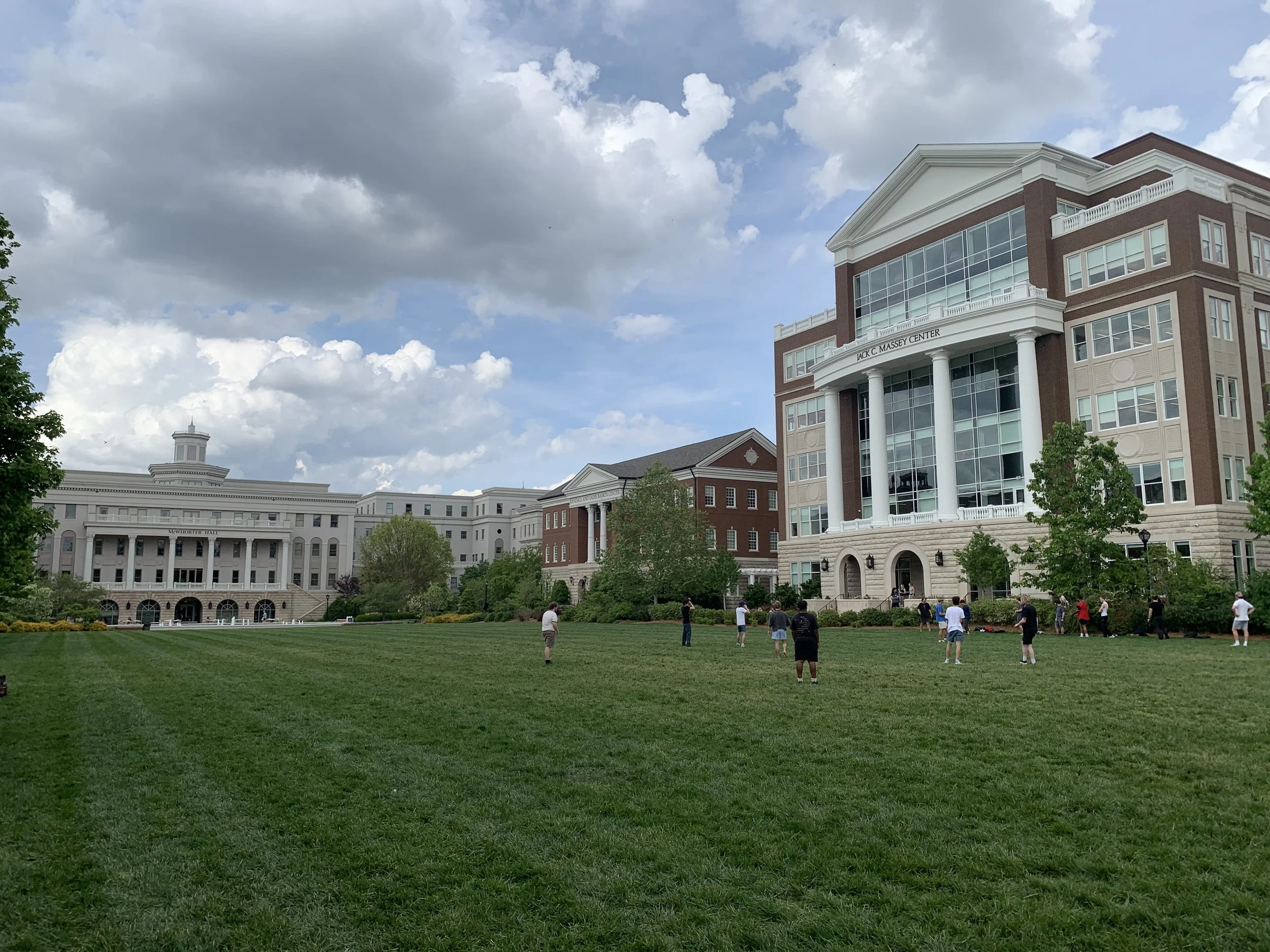Christian Faith and Political Agnosticism
Religion and Southern identity are closely intertwined. You can’t travel through the American South without feeling that religion is universal even if church attendance is receding as everywhere else. And where could the identity of the South be better studied than with the Southern Baptists, the predominant denomination with its biblical literalism. Where Donald Trump wants “America back” the Southern Baptists want to go “back to God”. Yet close to four out of five Southern Baptists will have voted for the current not so religious president. How does this go together? To find out we are in Nashville, Tennessee, the capital of country music which some have also called the “buckle of the bible belt”. And there, in the well-to-do southern suburb of Brentwood we find “Brentford Baptist”, a huge church, or better, a modern bible reading religious complex.
It is lunchtime at the “Surefire Café” as big as a German University canteen and Catherine, Leila and Derrick from the church’s communication department are discussing their daily work. All in their early 30s they are from religious families although Catherine’s father came from Syria. But after reading the bible, his daughter explains, he changed from “shame based” Islam to “transparent” Baptist Christianity and became a pastor in Tennessee “to teach the gospel to everybody”. They would admit that Church membership and attendance is going down everywhere, but they say that the new recruits of Generation “Z” to the Baptist cause are more serious and more “authentic” in their search for God because of the “hardships they are suffering”.
Still, Brentwood Baptist on 7777 Concord Road had more than 6.000 believers attending the Easter services, the preschool has 500 kids under five and the church caters for all kind of persons including those with special needs. In Pastor Jay Strother it has a compelling speaker whose sermons you can watch on the church’s website, as you can download the “Bible Reading Plan” from the app.
The Southern Baptist Convention (SBC), the umbrella organisation of, however, independent Southern Baptist Churches, has gone with the times. Since its relatively liberal phase in the 70s it has undergone a “conservative resurgence” and has been steadily moving to the right. In recent times it has been riveted by internal fights about women pastors and the acceptance of “critical race theory” leading to breakaways and some churches leaving the SBC. It seems that the Southern Baptists, founded in 1845 to safeguard the institution of slavery, have still not overcome their roots in racism.
At Brentwood Baptist, Catherine explains, “the pastor would never preach anything political from the stage”. Here they focus “on the gospel and their identity through Jesus”, she adds. For Derrick the current political controversy about DEI (diversity, equity and inclusion programs) is a culturally based issue. “Jesus does not see it that way.”
Yet what does the bible have to say about real life issues, concerning policies and Executive Orders from the White House. “You pray for the President” says Catherine, “but it is clear that we are all sinners, so we do not put faith in our political leaders because they all will fail”.
In his wonderful and evocative travelogue “Hunting Mr. Heartbreak” the late British novelist Jonathan Raban, writes about the history of this strain of thinking in the American South: “The Confederacy embraced predestination as a political necessity, …the slaveowner became the custodian of the Divine will. Conservatives were defending God’s own intended order against the blasphemous depredations of the godless armies of the North”. After having lost the civil war the segregationists still cited “God’s order” for shoving “negroes” to the back end of the bus. Do the rabid denunciations of diversity programs or the silent acceptance of unlawful deportations in the name of the gospel not smack of a similar kind of thinking?
How do these youn believers judge the current deportations of migrants? “It’s a tough one for us”, admits Leila, “it is the sad reality we live in until the day Jesus returns.” Is that all? “Just pray”, she adds, “and do to people crossing our path what you think is right”.
Belmont University Campus, Nashville, Tennessee
With those words we leave “Brentwood Baptist” and enter “Belmont University” just 12 miles towards the center of Nashville to find out what other students whose religious identity is still Christian but less fixated on the words of the bible think about current politics. Belmont University describes itself as a “christian-centered institution” which “welcomes students from a wide array of faith traditions”. In its grandiose neoclassical buildings it harbours almost 9.000 students in 138 undergraduate and 38 master programs. The yearly fee is about 45.000 Dollars, although half of the students will study with a grant.
On the lawn in front of the Jack C. Massey Center we find students playing baseball and Trayson, Rachel and Savannah preparing for their last class of the semester. They are freshmen/women in Business Studies and all come from conservative Christian families, although Trayson stresses that in his family they hold mixed political sympathies. “I do not like this political polarization”. So how do the students of Belmont University talk about the Trump Administration’s policies such as the ongoing deportations without due process? “We do not discuss politics among ourselves” says Rachel. “It does not affect people here in Tennessee as it does people in California or closer to the border”, Trayson explains.
When the visitor tells them about the outraged reaction in Europe to Trump’s antics on the international stage and describes in detail how the New York Times is critizising his Exexutive Orders, they seem visibly surprised. How do they get their news, I ask them? “We do not read newspapers” Savannah says, “we get our information from social media”. And how do they separate truth from fiction there? “When that becomes difficult we ask around among friends”.
You obviously don’t need to literally stick to the bible to become agnostic towards politics.
